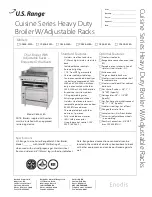
7
Safety Warnings and Instructions: Charging the Battery Pack
1. This manual contains important safety and operating instructions.
2. Before using battery charger, read all instructions and cautionary markings on (1)
battery charger, (2) battery pack, and (3) product using battery pack.
3.
CAUTION:
To reduce the risk of injury, charge only Black & Decker Battery
Packs. Other types of batteries may burst causing personal injury and damage.
4. Do not expose charger to rain or snow.
5. Use of an attachment not recommended or sold by Black & Decker may result in a
risk of fire, electric shock, or injury to persons.
6. To reduce risk of damage to electric plug and cord, pull by plug rather than cord
when disconnecting charger.
7. Make sure cord is located so that it will not be stepped on, tripped over, or
otherwise subjected to damage or stress.
8. An extension cord should not be used unless absolutely necessary. Use of
improper extension cord could result in a risk of fire, electric shock or electrocution.
a. Two-wire cords can be used with 2-wire or 3-wire extension cords. Only round
jacketed extension cords should be used, and we recommend that they be listed
by Underwriters Laboratories (U.L.). If the extension is to be used outside, the cord
must be suitable for outdoor use. Any cord marked for outdoor use can also be
used for indoor work. The letters "W" or "WA" on the cord jacket indicate that the
cord is suitable for outdoor use.
b. An extension cord must have adequate wire size (AWG or American Wire Gauge)
for safety, and to prevent loss of power and overheating. The smaller the gauge
number of the wire, the greater the capacity of the cable; that is, 16 gauge has
more capacity than 18 gauge. When using more than one extension to make up
the total length, be sure each extension contains at least the minimum wire size.
CHART FOR MINIMUM WIRE SIZE (AWG)OF EXTENSION CORDS
NAMEPLATE RATING AMPS – 0 – 10.0
Total Extension Cord Length (ft)
25
50
75
100
125 150
Wire Gauge
18
18
16
16
14 14
9. Use only the supplied charger when charging your drill. The use of any other
charger could damage the drill or create a hazardous condition.
10. Use only one charger when charging.
11. Do not attempt to open the charger or the drill. There are no customer serviceable
parts inside. Return to any authorized Black & Decker service center.
12. DO NOT incinerate the drill or battery packs even if they are severely damaged or
completely worn out. The batteries can explode in a fire.
13. A small leakage of liquid from the battery pack cells may occur under extreme
usage, charging or temperature conditions. This does not indicate a failure.
However, if the outer seal is broken and this leakage gets on your skin:
a. Wash quickly with soap and water.
b. Neutralize with a mild acid such as lemon juice or vinegar.
c. If the battery pack liquid gets in your eyes, flush them with clean water for a
minimum of 10 minutes and seek immediate medical attention.
MEDICAL NOTE:
The liquid is a 25-35% solution of potassium hydroxide.
CHARGING THE BATTERY PACK
Your drill may use either a jack plug charger or a cup charger, both of which are
described below. Please follow the directions for the type of charger that you have.
Chargers are designed to use standard 120 volt AC, 60 Hz power. Do not use DC or any
other voltage.
THE BATTERIES IN YOUR BATTERY PACK ARE NOT FULLY CHARGED AT THE
FACTORY. BEFORE ATTEMPTING TO CHARGE THEM, THOROUGHLY READ ALL
OF THE SAFETY INSTRUCTIONS.
INSTRUCTIONS FOR JACK PLUG CHARGERS:
1. Place the battery pack into the tool until it “clicks” into place.
2. Insert the charger plug into the connector as shown in
figure 1
.








































